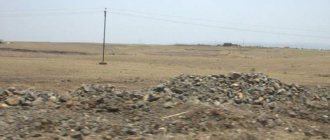Free use of land 2020: what is it, the parties to the agreement and its terms
Free-term use of land plots is permitted on the basis of an agreement concluded between the owner and the future user. Agreements of this type require mandatory registration with Rosreestr. Since the owner cedes the land to the user for a finite period of time, there is no transfer of ownership; the property remains on the balance sheet of the right holder.
Registration of land for free, urgent use occurs:
- The state is the owner of the land and transfers it for use to the municipality, government agencies, and state authorities, and all other persons can only agree on a lease transaction.
- A private owner enters into an agreement with another private person (individual or legal).
Free use agreement
The basic rules for drawing up agreements for the free use of land are contained in Art. 689-701 Civil Code of the Russian Federation. The essence of contracts of this type is that the owner of the land transfers it free of charge to the user (individual or legal entity) for a specific period, after which the user returns the plot in the same condition as it was on the date of signing the contract.
The user's obligations under the contract are as follows:
- Use the land only as permitted by its category, type of permitted use.
- Protect special signs (landmarks and geodesic) from damage.
- Take care of environmental protection.
- Comply with fire safety requirements.
- If the parties have specified deadlines for land development, ensure compliance with them.
- Comply with urban planning and sanitary-hygienic standards.
- Prevent deterioration of fertility and soil pollution.
- Comply with laws relating to land use.
The most important characteristics of the contract are its urgency and gratuitousness. In addition, essential information that must be included in the contract includes:
- Cadastral number of the plot.
- Land use category.
- Type of permitted use (code according to the VRI Classifier).
- Land area.
- The exact postal address of the site.
If any of the listed points is not in the contract, it is very easy to challenge it in court due to the lack of sufficient agreement.
Download the agreement for free use of land (sample)
What documents are needed to sign the contract?
To register an agreement for the temporary free use of land in Rosreestr, you will additionally need to collect the following package of documents:
- Passports of the parties, or powers of attorney addressed to representatives.
- Cadastral passport of the plot.
- With the participation of legal entities, copies of constituent documents with additions are provided.
- Receipt of payment of the state fee for registration of the contract.
Only those contracts whose validity period is less than 12 months are not required to be registered.
Termination of an agreement
If the parties did not want to indicate in the contract the duration of its validity, then this gives the right to either party to refuse it at any time. To do this, you need to notify the other party and agree on the timing of termination of contractual obligations.
Among the reasons for early termination of contracts for the gratuitous use of land plots at the initiative of the owner are the following:
- Inadequate fulfillment of the obligation to protect land fertility.
- The type of permitted land use does not correspond to the actual use.
- The land was transferred to a third party without proper approval from the owner.
The user of the site may refuse the transaction if:
- There are certain force majeure events beyond the control of the user.
- Hidden deficiencies of the site have been identified, due to which it cannot be used as the user intended.
- The land was not transferred to the user on time, or the owner violated other essential terms of the contract.
- The agreement does not take into account the legitimate interests of third parties related to this land.
The death of any of the parties, as well as the liquidation of a legal entity, is a sufficient basis for early termination of the contract. If the owner of the plot dies, the heirs assume responsibilities under the contract. If the liquidated entity has a legal successor, then the obligations under the agreement pass to him.
Land transfer procedure
The territory specified in the agreement may be state or private property. Art. 24 of the Land Code of the Russian Federation lists all situations in which contracts for gratuitous fixed-term use are concluded:
- Private owners give their lands to other citizens or organizations for use.
- State property is ceded to municipal authorities not for construction purposes for a period of up to 12 months.
- Land owned by industrial enterprises, forestries, hunting farms, and the transport industry.
- Municipal or state authorities transfer land to companies that have signed a government contract for construction financed from the local or federal budget.
- State or municipal lands are transferred to housing construction cooperatives.
- State or municipal lands are registered for development by religious and charitable organizations.
- State or municipal forest plots are transferred to private individuals.
Each of these cases has its own characteristics, which are reflected in the terms of the contract.
Differences between free use and rent
There is much in common between these two categories of contracts. In both the first and second cases, the user receives a plot of land, which he is obliged to take care of, and upon expiration of the contract, return it to the owner in its previous condition. In both cases, the user must use the land, so its non-use is a sufficient condition for termination of the contractual relationship.
In addition to the main difference - compensation, contracts also differ in that the tenant receives possession of the land on a leasehold basis, whereas with gratuitous use there is no talk of ownership.
How to obtain land for free use?
Each of us has the right to receive a plot of land for free, temporary use for:
- Construction of housing for your family.
- Farming.
- Farming activities.
Land is provided by municipal or state bodies for a period of up to 6 years. It is possible to obtain a plot only in those subjects of the federation in which the relevant law has been adopted. You can find out whether this law applies to a given locality by sending a request to the regional government. The period for receiving an official response is 30 days.
A plot of land in respect of which the user has fulfilled all the terms of the contract in good faith for 5 years can be transferred to the user's ownership free of charge if the appropriate application is submitted in a timely manner.
Here, much depends on the promptness of the applicant’s actions, as well as on the owner’s desire to conclude a transaction of this kind.
It is worth enlisting the support of a qualified lawyer who will help reduce the registration time as much as possible in order to meet the year allotted by law.
Source: https://law03.ru/land/article/bezvozmezdnoe-polzovanie-zemlej
Free use agreement
The basic rules for drawing up agreements for the free use of land are contained in Art. 689-701 Civil Code of the Russian Federation. The essence of contracts of this type is that the owner of the land transfers it free of charge to the user (individual or legal entity) for a specific period, after which the user returns the plot in the same condition as it was on the date of signing the contract.
The user's obligations under the contract are as follows:
- Use the land only as permitted by its category, type of permitted use.
- Protect special signs (landmarks and geodesic) from damage.
- Take care of environmental protection.
- Comply with fire safety requirements.
- If the parties have specified deadlines for land development, ensure compliance with them.
- Comply with urban planning and sanitary-hygienic standards.
- Prevent deterioration of fertility and soil pollution.
- Comply with laws relating to land use.
The most important characteristics of the contract are its urgency and gratuitousness. In addition, essential information that must be included in the contract includes:
- Cadastral number of the plot.
- Land use category.
- Type of permitted use (code according to the VRI Classifier).
- Land area.
- The exact postal address of the site.
Also on the topic: What is an easement on a land plot and how to establish it?
If any of the listed points is not in the contract, it is very easy to challenge it in court due to the lack of sufficient agreement.
Download the agreement for free use of land (sample)
Free urgent use of land: features and nuances
The right of gratuitous fixed-term use in modern Russia is one of the common rights to land plots, according to which the land is exploited in accordance with its intended purpose.
However, this right is not the right of ownership of land and only allows you to use the plot for your own purposes, but not to dispose of it.
Legislation
Legislative regulation of the right to free, fixed-term use of a land plot is carried out by two regulations - the Civil and Land Codes.
The Land Code in Article 24 explains in detail which plots can be provided for free, fixed-term use, as well as under what conditions. In addition, this rule of law explains who exactly can count on receiving a land plot with such rights.
The Civil Code allocates a whole block of articles (from 689 to 701) to regulate the right to gratuitous temporary use of a land plot. Within the framework of these articles, there is a detailed coverage of all those actions that must be taken to register the occurrence and operation of such a right.
If you want to find out how to solve your particular problem, please contact us through the online consultant form or call :
In addition, from the standpoint of civil legislation, it is deciphered what type of rights the right of gratuitous urgent use refers to, as well as what rights the user of a land plot obtained on such grounds has. The responsibilities of the user of such a site are also fixed in this regulatory act.
The concept and features of the right to free-term use of a land plot
The Civil Code of the Russian Federation defines the concept of gratuitous temporary use of a land plot in the form of a loan, one of the participants of which is the state (as the owner of the land plot provided to the user), and on the other hand, an individual or legal entity.
The main features of the concluded agreements will be:
- Gratuitousness, that is, the absence of any monetary payments for the right to use the site on the part of the user;
- Urgency of use (that is, limited time of use). However, by agreement of the parties, the contract can be extended, but also for a limited period. Another option may be the possibility of prolonging the contract if the parties have not decided to terminate it.
If we draw an analogy between two agreements - free-term use of a land plot and lease, then we can highlight the key difference between these two agreements:
If you want to find out how to solve your particular problem, please contact us through the online consultant form or call :
- In the case of a lease, the tenant receives the right, after concluding an agreement, not only to use the site, but also to own it (that is, to lease or assign its rights to another interested party);
- The recipient of a plot on the basis of the right of gratuitous temporary use can only personally use this plot in his own interests (for example, to organize a subsidiary farm).
What areas can be provided for free, fixed-term use?
The Land Code clearly regulates which plots of land can be provided for free, fixed-term use. A detailed explanation is given in Article 24 of this regulatory act.
Thus, on the basis of this right, lands such as:
- Those that are in state or municipal ownership, if they are provided to specialized government institutions, historical heritage centers, if such institutions have ceased to function - the period for provision will not be more than one year;
- Lands that can be provided to citizens or legal entities based on the conclusion of an agreement;
- Land owned by the state, provided as service plots (for example, to ensure an adequate standard of living for a person engaged in certain types of activities);
- Land plots provided from state ownership for the use of religious organizations.
Who can exercise this right?
The Civil Code establishes a rule according to which certain categories of the population or legal entities can receive land for free, fixed-term use. According to the requirements of this regulatory act, as well as the provisions of Article 24 of the Land Code, recipients of land plots on such grounds can be:
- Citizens and legal entities, if they plan to use the land for development;
- Religious organizations, if they plan to build specialized religious buildings or corresponding religious monuments;
- Construction organizations, if they erect structures to fulfill a government order;
- Legal entities, if they carry out the construction of housing construction cooperatives and cottage villages that do not have the status of administrative entities;
- Individuals and legal entities, if they operate the forest fund for the purposes specified in the concluded agreement.
State and municipal bodies can also act as a recipient of a plot on such grounds, however, the period of exploitation of the land in this case cannot exceed a period of more than one year from the date of conclusion of the agreement.
Transfer conditions
Article 24 of the Land Code of the Russian Federation sets out the conditions that must be met in order to fully formalize the right to gratuitous temporary use of a land plot. Such conditions will include:
- The period of provision of land to state or municipal institutions limited to one year for the full functioning of these bodies;
- The intended purpose of the land must be specified in the agreement, as well as in all transfer documents, with the obligatory indication of compliance with the requirements for using the land only for this purpose;
- Implementation of measures to protect the land plot and adjacent forests and reservoirs and preserve the quality of the land;
- Preservation of all special signs located on the site (landmarks, geodetic and cadastral signs).
In addition, it is prohibited to extend the right of sublease to plots obtained on the basis of the right of gratuitous fixed-term use, as well as to use such a plot as a contribution to the authorized capital or as collateral.
Agreement for free, fixed-term use of land: drafting, necessary documents and procedure for registration
The contract for gratuitous fixed-term use is concluded in accordance with the Civil Code of the Russian Federation.
The document is prepared in printed form, and the document itself must undergo mandatory registration as part of the legal confirmation of the transaction and the transfer of ownership.
The contract for gratuitous fixed-term use consists of a description:
- Preamble (which contains information about the parties to the agreement);
- Subject of the agreement (this section provides a description of the site that is the subject of the agreement, indicating the address and cadastral data of the site);
- The rights and obligations of the parties participating in the conclusion of the agreement, including the procedure for transferring the site, as well as the operation regime of the site, which must be fully observed;
- Force majeure circumstances, as well as possible options for resolving the current situation;
- Details of the parties and their signatures;
- Mandatory attachments from cadastral documents for the site.
To sign such an agreement, you will need to provide the following documents:
- The identity card of the applicant (if the contract is concluded with an individual) or the statutory documents of the legal entity with a decoding of the powers of the representative;
- Documents explaining the powers of the representative (if the agreement is concluded by the representative by proxy);
- Cadastral documents for the plot;
- Receipt of payment of the state fee for concluding the contract.
At the same time, if the agreement is valid for more than one year, it will need to be registered with Rosreestr. In order for such registration to be carried out, it is necessary to provide the following documents to the territorial divisions of Rosreestr or the MFC:
- Application for registration of the right of gratuitous temporary use and making appropriate changes to the Unified State Register of Rights to Real Estate;
- Agreement for gratuitous fixed-term use (in the number of copies, one greater than the number of parties, for example, if there are two parties, then there will be three copies, since one of the copies remains in Rosreestr);
- Receipt for payment of state duty.
Based on the results of consideration of the application, a decision is made within ten days to issue a certificate of the right to free temporary use of land and to issue such a certificate.
Procedure and grounds for termination
The Land and Civil Codes regulate the issue of termination of a contract for gratuitous fixed-term use. The conditions for termination of the contract must be recorded in the text of the document. However, if these rules are not fixed, the contract can be terminated by the parties at any time.
As a general rule, termination of a contract can occur in the following ways:
- Voluntary termination initiated by the user;
- Forced termination.
If we talk about voluntary termination, the user can terminate the contract if:
- Significant deficiencies of the site that were hidden at the conclusion of the contract will be discovered;
- The use of the land plot is possible by other persons, but there is no information about this possibility in the text of the agreement;
- The plot was not transferred by the owner to the user within the agreed period;
- The occurrence of force majeure circumstances, which cannot be overcome within the framework of the concluded agreement.
If we are talking about forced termination of a contract, then by a court decision such a contract can be terminated only if the following violations of legal requirements have been identified:
- The site is not used for the purpose specified in the terms of the contract;
- The condition of the land is deteriorating due to improper use;
- The use of land is carried out not by the party to the agreement, but by any other outsider.
But upon the death of the person with whom the contract was concluded, mandatory termination is not required, since all rights and obligations of the user pass from the testator to the heir.
At the same time, if some insurmountable circumstances occur, for example, a man-made or natural disaster, the agreement is considered terminated by the mutual desire of the parties.
The right to free, fixed-term use of a land plot is a special type of right, which implies the receipt of land for use on the basis of loan relations.
But the user can use this plot only for his own interests, and ownership, that is, even leasing the land to other persons, is prohibited and may entail termination of the contract.
Dear readers, the information in this article may be out of date. If you want to find out how to solve your particular problem, call the following numbers : Or visit the website. It's fast and free!
Source: https://zakonguru.com/nedvizhimost/zemelnyj/ispolzovanie-vladenie/pravo/bezvozmezdnoe-srochnoe-polzovanie-zemlej.html
Termination of an agreement
If the parties did not want to indicate in the contract the duration of its validity, then this gives the right to either party to refuse it at any time. To do this, you need to notify the other party and agree on the timing of termination of contractual obligations.
Among the reasons for early termination of contracts for the gratuitous use of land plots at the initiative of the owner are the following:
- Inadequate fulfillment of the obligation to protect land fertility.
- The type of permitted land use does not correspond to the actual use.
- The land was transferred to a third party without proper approval from the owner.
The user of the site may refuse the transaction if:
- There are certain force majeure events beyond the control of the user.
- Hidden deficiencies of the site have been identified, due to which it cannot be used as the user intended.
- The land was not transferred to the user on time, or the owner violated other essential terms of the contract.
- The agreement does not take into account the legitimate interests of third parties related to this land.
The death of any of the parties, as well as the liquidation of a legal entity, is a sufficient basis for early termination of the contract. If the owner of the plot dies, the heirs assume responsibilities under the contract. If the liquidated entity has a legal successor, then the obligations under the agreement pass to him.
Also on the topic: Recognition of ownership of a land plot: by inheritance, by privatization, through the court
The right to free temporary use of a land plot
/ Earth
One of the types of rights to plots of land provided for by the Russian Land Code is the right of gratuitous fixed-term use, which from a legal point of view is a right of obligation.
A civil law agreement for gratuitous use, regulated by Articles 689-701 of the Civil Code of the Russian Federation, applies to the legal relations under consideration, arising from the right of gratuitous urgent use of a plot of land.
Conditions for transferring plots of land for free, fixed-term use
Plots of land can be provided to the borrower for free, urgent use from lands that belong to the state, municipality, organizations or private owners.
Article 24 of the Russian Land Code defines an exhaustive list of situations in which plots of land are provided for free, urgent use to the borrower:
- from lands related to state or municipal property, authorized executive state bodies or municipal bodies, respectively, vested with the rights to provide plots of land within the limits of their powers, state-owned enterprises, municipal and state institutions, historical heritage centers of Russian presidents who have ceased to exercise their powers, municipal bodies and the state, for purposes not related to construction, for a period of no more than a year;
- from lands owned by owners - citizens or legal entities, in favor of other citizens and enterprises on the basis of a concluded agreement;
- from the lands of enterprises in certain sectors of the economy (transport industry, forestry, hunting, timber industry, organizations) as well as from lands belonging to nature reserves and national parks, to citizens in the form of a service allotment;
- from land owned by the municipality or the state, by executive competent bodies vested with the right to allocate the relevant plots of land to religious organizations, subject to prior approval of the construction sites of various objects (structures, buildings, structures for charitable and religious purposes) for the duration of the construction of these specified objects and for the time of free use of these buildings, structures, structures;
- from land owned by a municipality or state, by executive competent bodies empowered with the right to allocate relevant plots of land within the limits of their powers, to business entities with which state or municipal contracts have been drawn up for the construction of some real estate, fully financed from the federal budget , or the budget of a constituent entity of the Russian Federation, or the local budget. Municipal and state contracts that serve as a condition for the transfer of plots of land for free use must be concluded on the basis of an order (municipal or state) placed in full compliance with Law No. 94-FZ concerning state orders;
- from land owned by a municipality or the state, by executive competent bodies vested with the right to allocate relevant plots of land within the limits of their powers to housing construction cooperatives in the manner and in cases provided for by the legislator;
- forest plots of land owned by the municipality or the state, to citizens and enterprises.
The list of cases and conditions specified in the Russian Land Code when plots of land are transferred for free, urgent use is exhaustive.
Source: https://infonedvizhimost.com/zemlya/bezvozmezdnoe-srochnoe-polzovanie-zemelnym-uchastkom.html
Free-term use of land plots: regulation | Lawyer
Free-term use of land plots is a type of right to free use of land. We will talk in detail about the basis on which this right arises and how it is exercised in our article.
From a legal point of view, the right of gratuitous fixed-term use, provided for by the Land Code of the Russian Federation, is a right of obligation.
Land plots for gratuitous fixed-term use are provided to owners for a period that may be established by law - for plots in municipal or state ownership, by agreement - for plots in private ownership, for the period of labor relations - in the order of official allotments.
Important! Commercial organizations cannot transfer property for free use to persons who are their participants, founders, managers or members of its control or management bodies - clause 2 of Article 690 of the Civil Code of the Russian Federation.
Thus, the land legislation of the Russian Federation distinguishes three types of gratuitous fixed-term use of land:
- when a land plot belongs to the state, the plots are transferred for free use only to municipal or state institutions, state authorities and local self-government, other participants can only receive these plots for rent;
- when the land plot belongs to organizations of different industries;
- when the land belongs to legal entities or individuals, the plots are transferred for free use to other citizens or organizations on the basis of an agreement.
Termination of the contract: when the document ceases to be valid, early termination
If the contract does not specify a specific period of validity, each of the parties, as in any other transaction, has the right to terminate the contract early at any time, notifying the other party of its intention in advance. The reasons for early termination may be different:
- the original owner of the land plot can terminate the contract if : the land is poorly maintained, which leads to a deterioration in its condition;
- land is not used for its intended purpose;
- the land plot is transferred to a third party without the owner’s permission;
- force majeure circumstances have arisen that are beyond his control;
Complete termination of the agreement for the gratuitous use of land occurs in the event of the death of the land user or the liquidation of the legal entity that acted as the land user. In the event of the death of the land owner, his obligations under the contract pass to his heirs, and in the event of reorganization of a legal entity - to the legal successor.
Conditions for transferring land for free, fixed-term use
As mentioned above, the user can receive for free urgent use land that belongs to the municipality, state, legal entities or individuals. An exhaustive list of situations in which land is provided for free use is defined in Article 24 of the Land Code of the Russian Federation. This:
- located in state or municipal ownership, on the terms and in the manner established by Article 39.10 of the Land Code of the Russian Federation, including in the form of a service allotment;
- owned by citizens or legal entities, other citizens or legal entities on the basis of an agreement, including in the form of an official allotment.
The difference between free use and rent
The similarity with the legal relationship of leasing the right to free use is obvious - in both cases, an obligatory right to plots of land is established. In addition, in both cases, the land is transferred to a new user for use, however, in the case of a lease, this is a paid use, and in the other, accordingly, it is gratuitous.
The fundamental difference between leasing and free use of land is the fact that when renting, the land is transferred to the lessor not only for use, but also for ownership, which allows him to use a set of measures to protect the owner of the object, which the user of the land is completely deprived of in the form of free use.
Source: https://pravovedus.ru/practical-law/civil/bezvozmezdnoe-srochnoe-polzovanie-zemelnyimi-uchastkami
What gives the right to free use of a land plot and to whom is it given?
If such defects are discovered, the borrower has the right, at his choice, to demand from the lender the elimination of the defects of the thing free of charge or reimbursement of his expenses for eliminating the defects of the thing, or early termination of the contract and compensation for the actual damage suffered by him.
- The lender, notified of the requirements of the borrower or of his intention to eliminate the defects of the thing at the expense of the lender, may without delay replace the defective thing with another similar thing that is in proper condition.
- The lender is not responsible for defects of the thing that were agreed upon by him at the conclusion of the agreement, or were known to the borrower in advance, or should have been discovered by the borrower during the inspection of the thing or checking its serviceability when concluding the agreement or when transferring the thing.
- use the land only for the purpose specified in the use agreement.
- You also need to take into account the category to which it belongs.
- Maintain in good condition certain signs that are related to boundary, geodetic and other specialized types. We are talking about those that are placed on the ground as prescribed by the rules prescribed in the Land Code of the Russian Federation.
Free-term use of land plots
Free-term use of land involves the use of certain territories for some time. It is important to note that when concluding an agreement of this kind, the owner does not have the right to expect and demand benefits from the tenant.
Both individuals and legal entities can transfer and receive land free of charge. Land that is owned by the state and does not have a cadastral number is managed by communities and territorial associations.
Providing a land plot for free use does not imply the possibility of registering real rights to the land in the future. The only action on the part of the user is rent, and on preferential terms.
Features of free urgent use
Free legal consultation. Features of gratuitous temporary use of land are stipulated in the Land Code. Legal relations are regulated by the twenty-fourth article of this law. The official document also spells out the existing requirements for a legal transaction.
A party wishing to obtain land ownership for free use should be aware that the operation, from a legal point of view, requires the mandatory conclusion of an agreement - a document that will stipulate all the nuances and responsibilities of the parties during the period of validity of the agreement. The agreement is concluded in writing by two parties - the user and the main landowner.
The clauses of the agreement may include various information, since there is no single form (sample) used when completing this type of transaction. Despite this, it would be correct to check in the document:
- correctness and completeness of information about the owner and tenant;
- description of the land plot and its type;
- technical features;
- period of validity of the document;
- special requirements of the parties to each other.
Providing a land plot is only possible if the latter has clear boundaries! Plots that do not have exact coordinates cannot be leased until demarcation is carried out.
Read also: Experience for obtaining a veteran of labor
Responsibilities of a land tenant
The obligations of the land tenant may not be specified in the document, but the user should remember that, in addition to the conditions prescribed by the owner, he must also comply with the requirements of the state. They all relate to proper care and intended use of the site.
That is why, when acquiring rights to temporary use of land, the tenant is obliged to know that he is prohibited:
- Independently change the type and economic purpose of the site.
- Construct buildings and structures not provided for by the land class.
- To pollute and intend to spoil the entrusted site and the territory adjacent to it.
- Cut down green spaces without appropriate permission and plant new ones (except for residential areas and gardening areas).
- Apply insecticides and pesticides that can affect soil fertility.
A person who has taken a plot of land for immediate use on a free basis is required to protect land resources from fire and flooding.
Contract time
The validity period of the agreement drawn up under the procedure for the gratuitous transfer of land is not specified by law. Although in some cases it may have a clearly limited period, for example:
- The land was transferred for use to a person who entered into an employment contract with the enterprise and received departmental housing on land owned by the enterprise or local councils. In this situation, the period of use of the site is tied to the duration of the employment relationship
- A plot of land (agricultural share) is issued to a farmer for conducting economic activities. In this case, the contract is concluded for a period of no more than six years. In this case, the agreement, by mutual consent of the parties, can be extended upon expiration of the primary agreement.
- The land is allocated for free use to a non-profit or charitable enterprise. The period of use of the territory in such a situation will be equal to the time of existence of such an organization. When changing the form of ownership or reorganizing a budgetary enterprise, the land plot is returned to the manager.
- For associations of citizens whose activities are related to gardening and vegetable growing for personal needs, the period of use of the plots is five years. In some regions, plots are provided for a longer period, but then this norm is regulated by territorial amendments.
Read also: Is it possible to return the medicine?
All of the above applies only to lands that are the property of the state. In a situation where the plot of land is private, the terms of free use are negotiated by the parties during the cooperation transaction.
When one party to the contract was an individual and during the validity period of the document he dies, the contract does not terminate until the moment specified in the document. The assignees do not need to enter into a new agreement or make changes to the existing one.
Free legal consultation










